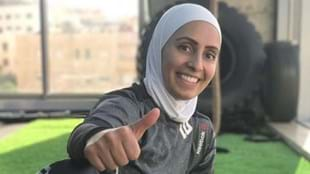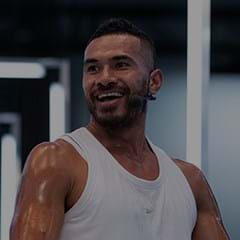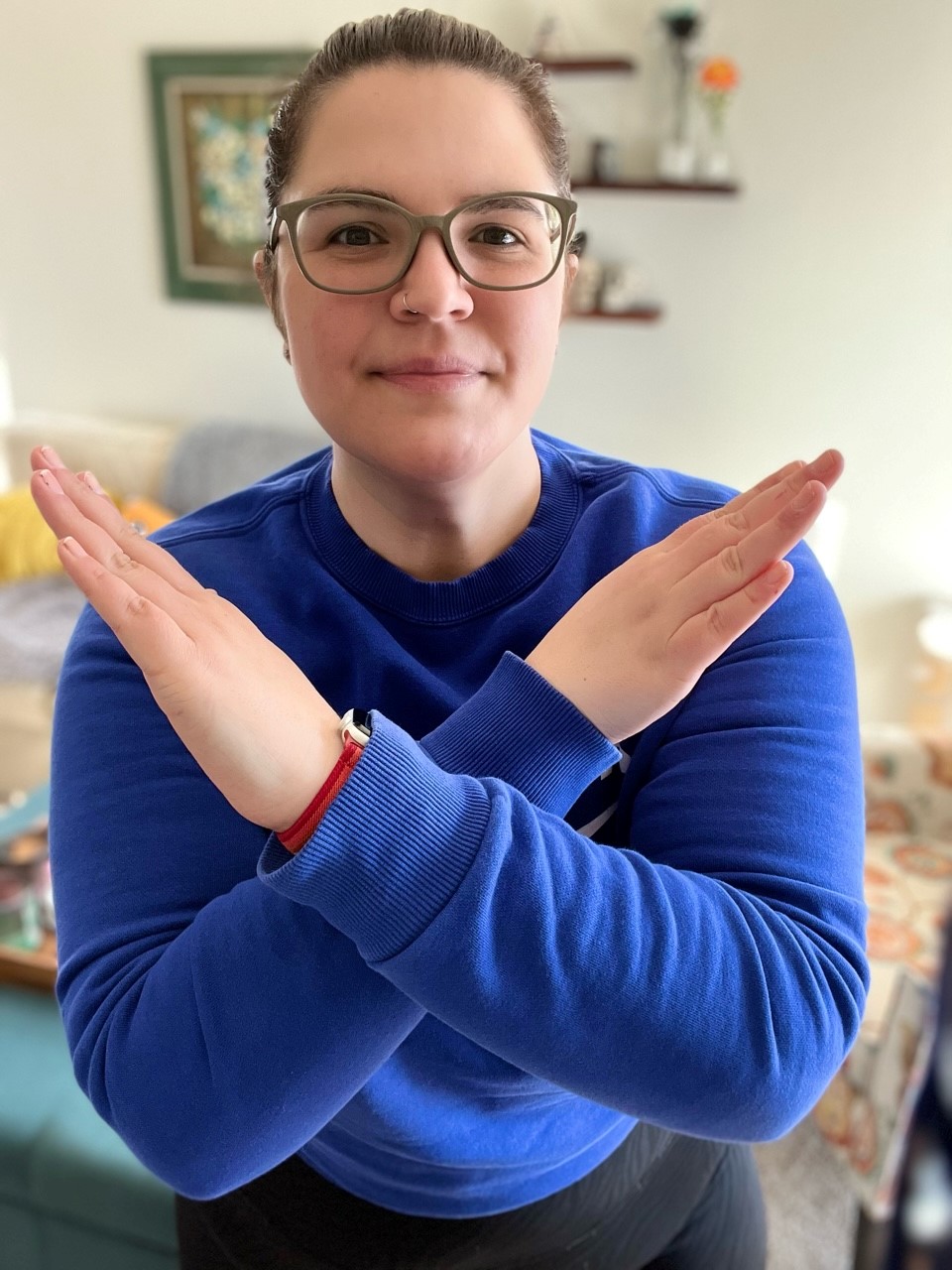
Grace Anne Thomas (US)
I've always been an active person. As a kid I spent more time running around outside and splashing in the pool than I did anywhere else. I played baseball; I was on the bowling team; and I spent my summers at camp playing tag in the 95-degree heat. But I was also fat, and according to the media and, well, anyone else you asked, that was the worst thing a person could be.
Being a woman in a larger body is always something that's made me self-conscious, but the older I get, the more I realize it’s because of what I've been told I should feel: shame. I spent many years feeling like I needed to shrink myself and take up less space. The world wanted me to hide and be less visible.
So – that’s what I did. I dieted. I ran. I ran a lot: nine half marathons, two triathlons, more 5K's than I can count. I literally shrunk myself – the scale fell by over 100 pounds. What didn’t change, though, was my perception of myself. The world applauded me and told me how good I looked but all I heard was that I didn’t look good before. When I gained most of the weight back, I could only imagine how “bad” I must look now, how disappointed in me everyone must be. Why are women told so fiercely to conform to such a narrow standard of beauty? And, why is it so threatening for someone who is not a size 2 to be radiant and confident?
There is one assumption that many people make about a fat person in a gym: they’re there to lose weight. Why else would they be there? Surely they don’t just enjoy moving their body, that’s not possible – fat people are lazy.
Sometime in 2013 I found myself in a BODYJAM™ class. I was mortified. I couldn’t dance. I didn’t want people to look at me and so I stood at the back of the room, fumbling around, tripping over my feet, but having the time of my life. I was hooked. I kept coming back, and with every class I slowly realized that BODYJAM was growing my confidence in ways I'd never imagined possible. I started to move closer and closer to the front of the room. The same thing happened in every Les Mills class I took: RPM™, BODYPUMP™, BODYATTACK™… I went from being the nervous person hiding at the back to wanting to be right at the front.
There is one assumption that many people make about a fat person in a gym: they’re there to lose weight. Why else would they be there? Surely they don’t just enjoy moving their body, that’s not possible – fat people are lazy. I've been fighting against this for many years now. As I ditched diet culture, my workouts went from being a chore or punishment for eating too much to becoming pure enjoyment. I showed up to class because I wanted to, because I loved it. I also secretly got a kick out of proving to everybody in the room that I, a larger person, could crush BODYATTACK just as hard as they could. I found myself digging into this feeling more and more. I wanted to prove that anyone, any body, could do absolutely anything.
There's so much bias around larger bodies in the fitness space – especially for women. There are so many assumptions to overcome – we’re lazy, we don’t know what we’re doing, we don’t belong there because “nobody wants to see that.” But what if I could be the person to change that? What if I could inspire people who might not normally come into a class to give it a try? Representation matters.
What if I became an Instructor? Could I do that? Would anybody take me seriously? Would anybody want to take BODYPUMP with someone who looked like me?
I still struggle with this. There's so much bias around larger bodies in the fitness space – especially for women. There are so many assumptions to overcome – we’re lazy, we don’t know what we’re doing, we don’t belong there because “nobody wants to see that.” But what if I could be the person to change that? What if I could inspire people who might not normally come into a class to give it a try? Representation matters.
I have a phenomenal circle of friends who are all Les Mills Instructors. When I began toying with the idea of wanting to be an Instructor myself, the support, excitement and encouragement I met with was like nothing I'd experienced before in my life. So, I signed up for BODYPUMP™ initial training.
The first time I stood in front of a class was one of the most terrifying things I've ever experienced. Now not only was I – a fat person – in a gym, but I was a fat person at the front of a class leading others in exercise. It was nerve-wracking, but I've never felt more proud of myself. It almost felt rebellious. For so long I was told to shrink myself and not be seen until I was thin and worthy of being looked at, and to finally stand up against that narrative was a powerful moment.
I know there are plenty of people who will hold tightly to the thought that Instructors should look a certain way – "strong” and “fit”. It’s something I heard through the grapevine when I was being hired at my first club. And it hurt to hear. But it also lit a fire inside of me, and I was ready to prove everyone wrong.
The first time I stood in front of a class was one of the most terrifying things I've ever experienced. Now not only was I – a fat person – in a gym, but I was a fat person at the front of a class leading others in exercise. It was nerve-wracking, but I've never felt more proud of myself. It almost felt rebellious. For so long I was told to shrink myself and not be seen until I was thin and worthy of being looked at, and to finally stand up against that narrative was a powerful moment.
My ultimate fantasy is to change the fitness world. I want to prove that “strong” and “fit” do not have a specific look. Strong looks different on me than it does on anybody else and it’s definitely time that our differences, all of them, are celebrated and seen as strengths, not hindrances.
I may never change the minds of the entire industry – in fact, I probably won’t. But if I can change just one person’s view in understanding how important it is to have leaders who represent all body types, all areas of life, and all identities, I'll consider that a great success.
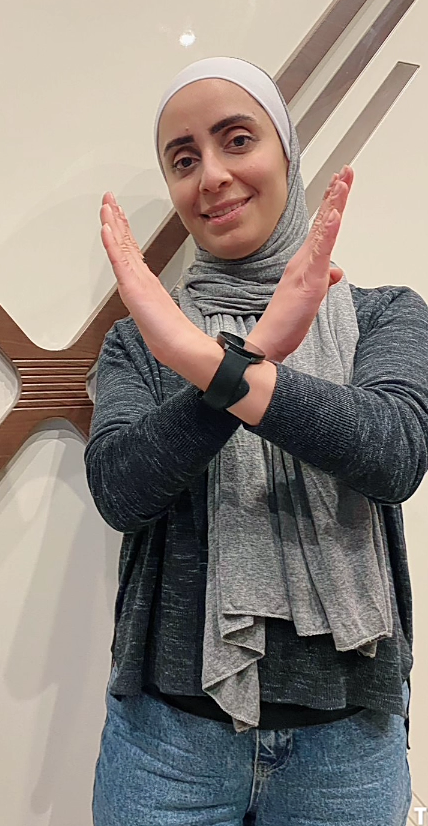
Muna Ardah (Middle East)
My name is Muna Ardah. I am a hijabi woman. And I live in Jordan.
Hijab in Islam refers to the complete covering of everything except the hands, face and feet in long, loose and non-transparent garments. A woman who wears a hijab is called Muhaajaba. Muslim women are required to observe the hijab in front of any man they could theoretically marry! A woman can choose to wear a hijab or not. Nobody can force her: I have a sister who chose not to wear it.
Sports have always been my passion. I used to run and play basketball back in school. I initially joined the gym as a member before I fell in love with BODYCOMBAT™ and decided to start teaching it. I'm also certified in BODYPUMP and LES MILLS TONE™ and have attended many Les Mills events around the world, meeting many Trainers and Presenters.
Fitness is for all. I don't need to be a man to be able to run or jump. I don't have to be white to be an indoor cycling instructor. I don't have to be thin or have a fit body to enjoy classes and burn calories!
At first, it felt annoying to be the only one wearing a hijab at an event. Instructors in non-Arab countries used to stare and some of them asked: "How do you exercise with a head cover? Is it comfortable to do sports wearing long sleeves and a hijab? Does it affect your performance or technique?" What really bothered me was the look in some people's eyes. Initially I felt very uncomfortable. But eventually I realized – it's good to be different. I was able to spot myself in the Masterclass of BODYCOMBAT 75 (filmed in Amsterdam) because of my hijab, how great is that!
I discovered that I didn't really care how people see me; what really matters is how I see myself. I decided to keep travelling and attending Les Mills events, to show the whole world that hijabi women can do sports and can shine. With time, people have gotten more used to seeing hijabi women. At Les Mills Live in Stockholm, for example, I saw more than 10 hijabi women. It felt amazing.
It’s important that everyone is represented in fitness, because we're all human. "You're not better than anyone and nobody is better than you" is a truth that most of us know but tend to ignore. Fitness is for all. I don't need to be a man to be able to run or jump. I don't have to be white to be an indoor cycling Instructor. I don't have to be thin, or have a fit body to enjoy classes and burn calories!
To me, “breaking the bias” means there is no place for discrimination, and I will never be silent about that.
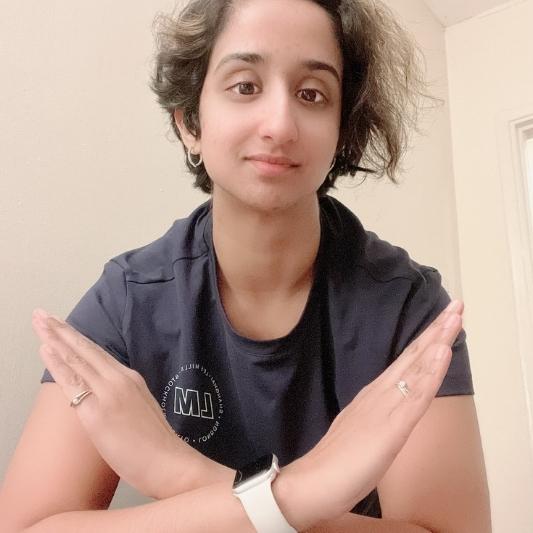
Priya Martin (UK)
Truth be told, I didn’t start out in the fitness industry. I primarily work as an Architect, and while I've not faced discrimination as a woman recently, there were certainly occasions at the start of my career where the fact that I'm a woman AND of an ethnic minority put me at a disadvantage when it came to progression. There's still some unconscious bias in construction, but I’ve constantly tried to defy that.
My journey into fitness has been a very different experience.
Having taken steps to become healthier and fitter to prevent future illnesses my family is prone to (diabetes and heart problems) I went on to pursue martial arts, leading to me gaining a Grade 3 in Muay Thai. I love the buzz and adrenaline I get from feeling strong, empowered and brave from that sort of exercise. So when the pandemic set in, I took the plunge to certify in three Les Mills programs (BODYCOMBAT, BODYPUMP and SH'BAM™).
The fact I'm an ethnic minority woman hasn’t been a barrier for me in terms of the fitness industry – I've been able to get regular classes and find cover work in my home county of Kent quite easily. Rather, the bias has come from others who share the same background as me, because it’s not seen as "normal" for my type of woman to be doing what I do. In their eyes, I should be following the "status quo".
The fact I'm an ethnic minority woman hasn’t been a barrier for me in terms of the fitness industry – I've been able to get regular classes and cover work in my home county of Kent. Rather, the bias has come from others who share the same background as me, because it’s not seen as "normal" for my type of woman to be doing what I do. In their eyes, I should be following the "status quo".
What's been incredibly rewarding is seeing more ethnic minority women attend classes in my local gym and have them express how refreshing they find it to see someone like me teaching the class. People of different ages, races and genders show up, and they keep coming back not just because they find me welcoming, but because they are also welcoming to one another. I always try to create this sense of inclusivity in my classes, because I can't bear to see anyone feeling left out.
My public speaking skills have been my saving grace in terms of being comfortable in front of groups. For nearly 10 years I've presented at conferences, lectures, and events across the country. I campaign about diversity and inclusion, as well as mental health and wellbeing, sometimes to as many as 300-400 people. Interestingly, I had individuals within my immediate South Asian community frown upon the fact that a woman like me would even talk about mental health, like it was a taboo. It was even more frowned upon when people knew I taught BODYCOMBAT, as though it was too “masculine”. Being a Les Mills Instructor has given me facets and further dimensions I didn’t know I was capable of.
I had individuals within my immediate South Asian community frown upon the fact that a woman like me would even talk about mental health, like it was a taboo. It was even more frowned upon when people knew I taught BODYCOMBAT, as though it was too “masculine”. Being a Les Mills Instructor has given me facets and further dimensions I didn’t know I was capable of.
I don’t know any other Les Mills instructors like me, but why should I feel insecure about that? I’ve got full classes, and I feel that diversity is celebrated in the studio: no questions asked, no labels, no judgement. That’s why, for me, the biggest success is people coming back to my class. I’m a trailblazer and I’ve grown to accept that I don’t fit into a mould – I’m not a carbon copy of anyone else. I just do what I do, and I want to be good at it to give people the experience they've come for.
Fitness impacts us all. As Instructors, we have a duty of care to keep an open mind. I've found that talking to my participants, genuinely showing interest in their individual motivation, has created a safe space for them to thrive and reach their potential. Instructors lead by example. I am proud to be a woman of color, but I'm defined by so much more. I'm defined by having a good heart. I’ve won by showing up. So have ALL my participants. This, for me, is breaking the bias.



